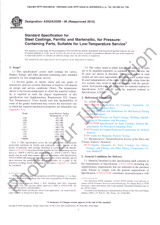Wir benötigen Ihre Einwilligung zur Verwendung der einzelnen Daten, damit Sie unter anderem Informationen zu Ihren Interessen einsehen können. Klicken Sie auf "OK", um Ihre Zustimmung zu erteilen.
ASTM D1298-12b(2017)e1
Standard Test Method for Density, Relative Density, or API Gravity of Crude Petroleum and Liquid Petroleum Products by Hydrometer Method (Includes all amendments and changes 3/14/2023).
Name übersetzen
NORM herausgegeben am 15.7.2017
Informationen über die Norm:
Bezeichnung normen: ASTM D1298-12b(2017)e1
Ausgabedatum normen: 15.7.2017
SKU: NS-1135562
Zahl der Seiten: 8
Gewicht ca.: 24 g (0.05 Pfund)
Land: Amerikanische technische Norm
Kategorie: Technische Normen ASTM
Kategorie - ähnliche Normen:
Die Annotation des Normtextes ASTM D1298-12b(2017)e1 :
Keywords:
API gravity, crude petroleum, density, hydrometer, Petroleum Measurement Tables, petroleum products, relative density, specific gravity,, ICS Number Code 75.040 (Crude petroleum),75.080 (Petroleum products in general)
Ergänzende Informationen
| Significance and Use | ||||||||||||||
|
5.1 Accurate determination of the density, relative density (specific gravity), or API gravity of petroleum and its products is necessary for the conversion of measured volumes to volumes or masses, or both, at the standard reference temperatures of 15 °C or 60 °F during custody transfer. 5.2 This procedure is most suitable for determining the density, relative density (specific gravity), or API gravity of low viscosity transparent liquids. This procedure can also be used for viscous liquids by allowing sufficient time for the hydrometer to reach temperature equilibrium, and for opaque liquids by employing a suitable meniscus correction. Additionally for both transparent and opaque fluids the readings shall be corrected for the thermal glass expansion effect and alternative calibration temperature effects before correcting to the reference temperature. 5.3 When used in connection with bulk oil measurements, volume correction errors are minimized by observing the hydrometer reading at a temperature close to that of the bulk oil temperature. 5.4 Density, relative density, or API gravity is a factor governing the quality and pricing of crude petroleum. However, this property of petroleum is an uncertain indication of its quality unless correlated with other properties. 5.5 Density is an important quality indicator for automotive, aviation and marine fuels, where it affects storage, handling and combustion. |
||||||||||||||
| 1. Scope | ||||||||||||||
|
1.1 This test method covers the laboratory determination using a glass hydrometer in conjunction with a series of calculations, of the density, relative density, or API gravity of crude petroleum, petroleum products, or mixtures of petroleum and nonpetroleum products normally handled as liquids, and having a Reid vapor pressure of 101.325 kPa (14.696 psi) or less. Values are determined at existing temperatures and corrected to 15 °C or 60 °F by means of a series of calculations and international standard tables. 1.2 The initial hydrometer readings obtained are uncorrected hydrometer readings and not density measurements. Readings are measured on a hydrometer at either the reference temperature or at another convenient temperature, and readings are corrected for the meniscus effect, the thermal glass expansion effect, alternative calibration temperature effects and to the reference temperature by means of the Petroleum Measurement Tables; values obtained at other than the reference temperature being hydrometer readings and not density measurements. 1.3 Readings determined as density, relative density, or API gravity can be converted to equivalent values in the other units or alternative reference temperatures by means of Interconversion Procedures (API MPMS Chapter 11.5), or Adjunct to D1250 Guide for Petroleum Measurement Tables (API MPMS Chapter 11.1), or both, or tables, as applicable. 1.4 The initial hydrometer readings determined in the laboratory shall be recorded before performing any calculations. The calculations required in Section 10 shall be applied to the initial hydrometer reading with observations and results reported as required by Section 11 prior to use in a subsequent calculation procedure (ticket calculation, meter factor calculation, or base prover volume determination). 1.5 Annex A1 contains a procedure for verifying or certifying the equipment for this test method. 1.6 The values stated in SI units are to be regarded as standard. 1.6.1 Exception—The values given in parentheses are provided for information only. 1.7 This standard does not purport to address all of the safety concerns, if any, associated with its use. It is the responsibility of the user of this standard to establish appropriate safety and health practices and determine the applicability of regulatory limitations prior to use. 1.8 This international standard was developed in accordance with internationally recognized principles on standardization established in the Decision on Principles for the Development of International Standards, Guides and Recommendations issued by the World Trade Organization Technical Barriers to Trade (TBT) Committee. |
||||||||||||||
| 2. Referenced Documents | ||||||||||||||
|
Empfehlungen:
Aktualisierung der technischen Normen
Wollen Sie sich sicher sein, dass Sie nur die gültigen technischen Normen verwenden?
Wir bieten Ihnen eine Lösung, die Ihnen eine Monatsübersicht über die Aktualität der von Ihnen angewandten Normen sicher stellt.
Brauchen Sie mehr Informationen? Sehen Sie sich diese Seite an.




 Cookies
Cookies
